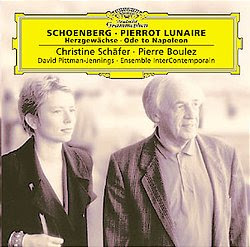 I
IMany readers will associate the clown Pierrot with the kitsch porcelain statuettes and the sentimental pictures found in the homes of the elderly. But the melancholic and naive clown has a nightside: he is moonstruck, and the moonstruck are lunatic, and the lunatic are dangerous.
What if Pierrot's white-face maquillage was an antecedent of corpse-paint?
II
In Thomas Mann's novel "Doktor Faustus", the protagonist Adrian Leverkühn is an expressionist composer who sells his soul to the Devil in exchange for 25 years of musical genius. Leverkühn, whose music becomes more and more apocalyptic as his sanity is slowly worn away by Satan, is a thinly disguised Arnold Schönberg, as Mann points out in a short afterword to the novel.
Mann's descriptions of Leverkühn's music prompted me to buy Schönberg's 1908-09 composition 'Pierrot Lunaire'. I was lucky enough to find a cut-price edition of the composition on Deutsche Grammofon, conducted by Pierre Boulez, with the Ensemble InterContemporain and with soprano Christine Schäfer singing parlando.
Wikipedia points out: "Pierrot Lunaire is a work that contains many paradoxes: the instrumentalists, for example, are soloists and an orchestra at the same time; Pierrot is both the hero and the fool, acting in a drama that is also a concert piece, performing cabaret as high art and vice versa with song that is also speech; and his is a male role sung by a woman, who shifts between the first and third persons". Thus, the composition places ambiguity central stage. As anthropologist Mary Douglas pointed out, ambiguity can be very disturbing, as it threatens the way humans order and give meaning to the perceived world. Ambiguity equals uncleanness, ritual pollution, defilement, supernatural danger.
The album documents an almost luridly beautiful performance. However cultured and civilized classical composition may be, there is something hallucinatory, something deranged, something apocalyptic, about this music. The composition is very expressionistic, the music moving along angles as odd as those of any building in Das Kabinett des Doktor Caligari. Schäfer's singing is appropriately mime-like, highly stylized, almost as if she expresses her vocal art through body motions, without use of speech; and the lyrical themes of blasphemy, eroticism, violence and murder endow her voice with a baneful aura.
III
Here a five YouTube videos of Tempus Fugit performing Schönberg's 'Pierrot Lunaire'.
IV
Through Schönberg's composition, I discovered the almost-forgotten Belgian poet Albert Giraud. Giraud (a pen-name of Émile Albert Kayenberg) wrote the poem-cycle "Pierrot Lunaire", which furnished the title of and the words to the piece of music. Giraud (1960-1929) was a symbolist, a proponent of "art-for-art's-sake" and an admirer of Baudelaire (what a sad fate to admire the sharpest contemporary detractor of one's native country and people! To admire Baudelaire as a Belgian now is one thing, but to admire him then...). Poor Giraud, because of Schönberg's composition Otto Erich Hartleben's translation of his work became better-known than the French original.
The entire poem-cycle is reproduced in French and in a poor English translation here. Below are reproduced two poems in French. I provided both with a literal English translation (translations for which I claim no artistic quality as I am neither a poet nor a trained translator).
Messe rouge
Pour la cruelle Eucharistie,
Sous l'éclair des ors aveuglants
Et des cierges aux feux troublants,
Pierrot sort de la sacristie.
Sa main, de la Grâce investie,
Déchire ses ornements blancs,
Pour la cruelle Eucharistie,
Sous l'éclair des ors aveuglants,
Et d'un grand geste d'amnistie
Il montre aux fidèles tremblants
Son coeur entre ses doigts sanglants,
-- Comme une horrible et rouge hostie
Pour la cruelle Eucharistie.
Red Mass
For a cruel Communion
Under rays of blinding gold
And of church candle's flickering light
Pierrot leaves the sacristy.
His hands, with Grace invested,
Tear at the priestly robes
For a cruel Communion
Under rays of blinding gold
And with a gesture of benediction
He shows the trembling believers
His heart in his blood-stained hands
Like a terrible and crimson wafer
For a cruel Communion
Papillons noirs
De sinistres papillons noirs
Du soleil ont éteint la gloire,
Et l'horizon semble un grimoire
Barbouillé d'encre tous les soirs.
Il sort d'occultes encensoirs
Un parfum troublant la mémoire;
De sinistres papillons noirs
Du soleil ont éteint la gloire.
Des monstres aux gluants suçoirs
Recherchent du sang pour le boire,
Et du ciel, en poussière noire,
Descendent sur nos désespoirs.
De sinistres papillons noirs.
Black Butterflies
Sinister black butterflies
Extinguished the sun's glory
And the sky looks like a wizard's book
Ink-stained every evening.
From occult censers waft
Perfumes troubling memory:
Sinister black butterflies
Extinguished the sun's glory.
Monsters with sticky suckers
Searching for blood to drink,
And from the skies, like black powder,
Descend upon our desperation
Sinister black butterflies
Post scriptum
Here is an interesting analysis of Schönberg's "Pierrot Lunaire" (link).




No comments:
Post a Comment